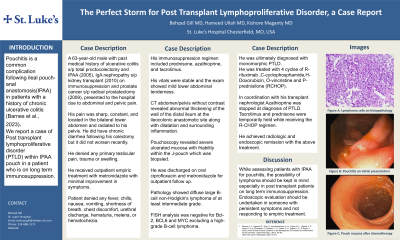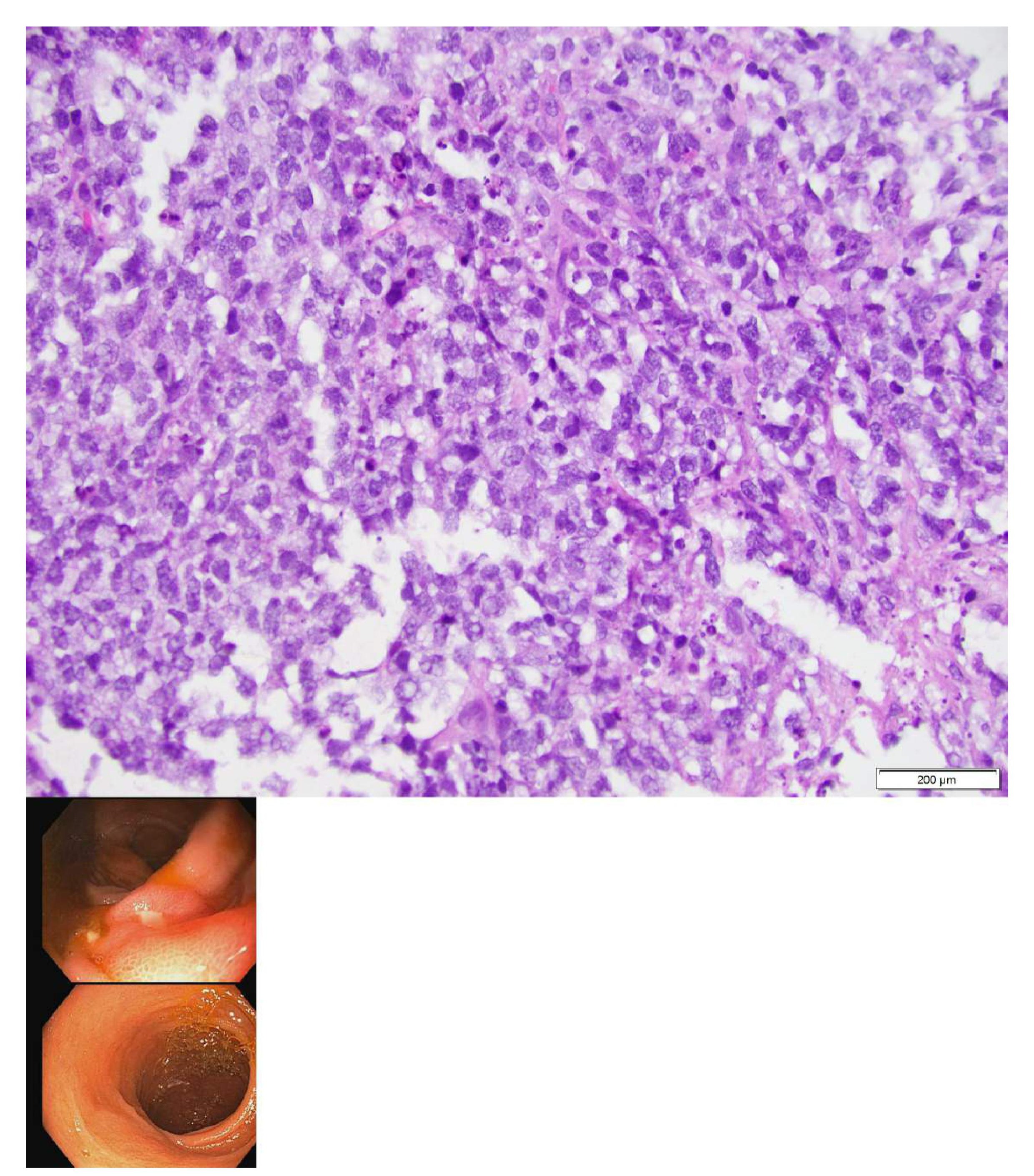Monday Poster Session
Category: IBD
P2734 - The Perfect Storm for Post Transplant Lymphoproliferative Disorder: A Case Report
Monday, October 28, 2024
10:30 AM - 4:00 PM ET
Location: Exhibit Hall E

Has Audio
- BG
Behzad Gill, MD
Saint Luke's Hospital
Chesterfield, MO
Presenting Author(s)
Behzad Gill, MD, Hameed Ullah, MD, Kishore Maganty, MD
Saint Luke's Hospital, Chesterfield, MO
Introduction: Pouchitis is a common complication following ileal pouch-anal anastomosis(IPAA) in patients with a history of chronic ulcerative colitis. We report a case of Post transplant lymphoproliferative disorder
(PTLD) within IPAA pouch in a patient who is on long term immunosuppression.
Case Description/Methods: A 63-year-old male with past medical history of ulcerative colitis s/p total proctocolectomy and IPAA (2005), IgA nephropathy s/p kidney transplant (2010) on immunosuppression and prostate cancer s/p radical prostatectomy (2009), presented to the hospital due to abdominal and pelvic pain. His pain was sharp, constant, and located in the bilateral lower abdomen and radiated to his pelvis. He did have chronic diarrhea following his colectomy but it did not worsen recently. He denied any primary testicular pain, trauma or swelling. He received outpatient empiric treatment with metronidazole with minimal improvement in symptoms. Patient denied any fever, chills, nausea, vomiting, shortness of breath, chest discomfort, urethral discharge, hematuria, melena or hematochezia. His immunosuppression regimen included prednisone, azathioprine and tacrolimus. His vitals were stable and the exam showed mild lower abdominal tenderness.
CT abdomen/pelvis without contrast revealed abnormal thickening of the wall of the distal ileum at the ileocolonic anastomotic site along with dilatation and surrounding inflammation. Pouchoscopy revealed severe ulcerated mucosa with friability within the J-pouch which was biopsied. He was discharged on oral ciprofloxacin and metronidazole for outpatient follow up.
Pathology showed diffuse large B-cell non-Hodgkin's lymphoma of at least intermediate grade. FISH analysis was negative for Bcl-2, BCL6 and MYC excluding a high-grade B-cell lymphoma. He was ultimately diagnosed with monomorphic PTLD. He was treated with 4 cycles of R-rituximab ,C-cyclophosphamide,H- Doxorubicin, O-vincristine and P- prednisilone (RCHOP). In coordination with his transplant nephrologist Azathioprine was stopped at diagnosis of PTLD. Tacrolimus and prednisone were temporarily held while receiving the R-CHOP regimen. He achieved radiologic and endoscopic remission with the above treatment.
Discussion: While assessing patients with IPAA for pouchitis, the possibility of lymphoma should be kept in mind especially in post transplant patients on long term immunosuppression. Endoscopic evaluation should be undertaken in someone with persistent symptoms and not responding to empiric treatment.

Disclosures:
Behzad Gill, MD, Hameed Ullah, MD, Kishore Maganty, MD. P2734 - The Perfect Storm for Post Transplant Lymphoproliferative Disorder: A Case Report, ACG 2024 Annual Scientific Meeting Abstracts. Philadelphia, PA: American College of Gastroenterology.
Saint Luke's Hospital, Chesterfield, MO
Introduction: Pouchitis is a common complication following ileal pouch-anal anastomosis(IPAA) in patients with a history of chronic ulcerative colitis. We report a case of Post transplant lymphoproliferative disorder
(PTLD) within IPAA pouch in a patient who is on long term immunosuppression.
Case Description/Methods: A 63-year-old male with past medical history of ulcerative colitis s/p total proctocolectomy and IPAA (2005), IgA nephropathy s/p kidney transplant (2010) on immunosuppression and prostate cancer s/p radical prostatectomy (2009), presented to the hospital due to abdominal and pelvic pain. His pain was sharp, constant, and located in the bilateral lower abdomen and radiated to his pelvis. He did have chronic diarrhea following his colectomy but it did not worsen recently. He denied any primary testicular pain, trauma or swelling. He received outpatient empiric treatment with metronidazole with minimal improvement in symptoms. Patient denied any fever, chills, nausea, vomiting, shortness of breath, chest discomfort, urethral discharge, hematuria, melena or hematochezia. His immunosuppression regimen included prednisone, azathioprine and tacrolimus. His vitals were stable and the exam showed mild lower abdominal tenderness.
CT abdomen/pelvis without contrast revealed abnormal thickening of the wall of the distal ileum at the ileocolonic anastomotic site along with dilatation and surrounding inflammation. Pouchoscopy revealed severe ulcerated mucosa with friability within the J-pouch which was biopsied. He was discharged on oral ciprofloxacin and metronidazole for outpatient follow up.
Pathology showed diffuse large B-cell non-Hodgkin's lymphoma of at least intermediate grade. FISH analysis was negative for Bcl-2, BCL6 and MYC excluding a high-grade B-cell lymphoma. He was ultimately diagnosed with monomorphic PTLD. He was treated with 4 cycles of R-rituximab ,C-cyclophosphamide,H- Doxorubicin, O-vincristine and P- prednisilone (RCHOP). In coordination with his transplant nephrologist Azathioprine was stopped at diagnosis of PTLD. Tacrolimus and prednisone were temporarily held while receiving the R-CHOP regimen. He achieved radiologic and endoscopic remission with the above treatment.
Discussion: While assessing patients with IPAA for pouchitis, the possibility of lymphoma should be kept in mind especially in post transplant patients on long term immunosuppression. Endoscopic evaluation should be undertaken in someone with persistent symptoms and not responding to empiric treatment.

Figure: Images(in the given order) above show (a) Lymphoma cells on Histopathology (b) Pouchitis on initial presentation (c) Pouch mucosa after chemotherapy
Disclosures:
Behzad Gill indicated no relevant financial relationships.
Hameed Ullah indicated no relevant financial relationships.
Kishore Maganty indicated no relevant financial relationships.
Behzad Gill, MD, Hameed Ullah, MD, Kishore Maganty, MD. P2734 - The Perfect Storm for Post Transplant Lymphoproliferative Disorder: A Case Report, ACG 2024 Annual Scientific Meeting Abstracts. Philadelphia, PA: American College of Gastroenterology.
